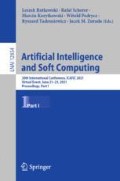Abstract
The paper demonstrates how to realize neural vector quantizers by means of quantum computing approaches. Particularly, we consider self-organizing maps and the neural gas vector quantizer for unsupervised learning as well as generalized learning vector quantization for classification learning. We show how quantum computing concepts can be adopted for these algorithms. The respective mathematical framework is explained in detail.
A. E. is supported by an ESF PhD grant.
Access this chapter
Tax calculation will be finalised at checkout
Purchases are for personal use only
References
Aïmeur, E., Brassard, Gr., Gambs, S.: Quantum clustering algorithms. In: Proceedings of the 24th International Conference on Machine Learning, vol. 518, pp. 1–8 (2007)
Aïmeur, E., Gr. Brassard, and S. Gambs. Quantum speed-up for unsupervised learning. Mach. Learn. 90(2), 261–287 (2013)
Bausch, J.: Recurrent quantum neural networks. In: Advances in Neural Information Processing Systems 33 (NIPS 2020), pp. 1–11. Curran Associates Inc. (2020)
Biehl, M., Hammer, B., Villmann, T.: Prototype-based models in machine learning. Wiley Interdisciplinary Rev. Cogn. Sci. 2, 92–111 (2016)
Clopper, C., Pearson, E.S.: The use of confidence or fiducial limits illustrated in the case of the binomial. Biometrika 26, S. 404—413 (1934). https://doi.org/10.1093/biomet/26.4.404
Dunjko, V., Taylor, J.M., Briegel, H.J.: Quantum-enhanced machine learning. Phys. Rev. Lett. 117(130501), 1–6 (2016)
Erwin, E., Obermayer, K., Schulten, K.: Self-organizing maps: ordering, convergence properties and energy functions. Biol. Cyb. 67(1), 47–55 (1992)
Feynman, R.P.: Quantum mechanical computers. Optics News 11(2), 11–20 (1985)
Grover, L.K.: Quantum mechanics helps in searching for a needle in a haystack. Phys. Rev. Lett. 79, 325–328 (1997)
Heskes, T.: Energy functions for self-organizing maps. In: Oja, E., Kaski, S. (eds.) Kohonen Maps, pp. 303–316. Elsevier, Amsterdam (1999)
Horn, D., Gottlieb, A.: Algorithm for data clustering in pattern recognition problems based on quantum mechanics. Phys. Rev. Lett. 88(1), 1–4 (2002)
Kerenidis, I., Landman, J., Luongo, A., Prakash, A.: q-means: a quantum algorithm for unsupervised machine learning. In: Wallach, H., Larochelle, H., Beygelzimer, A., dAlché Buc, F., Fox, E., Garnett, R. (eds.) Advances in Neural Information Processing Systems 32 (NIPS 2019), pp. 4134–4144. Curran Associates Inc. (2019)
Kohonen, T.: Learning Vector Quantization. Neural Networks 1(Supplement 1), 303 (1988)
Kohonen, T.: Self-Organizing Maps. Springer Series in Information Sciences, vol. 30. Springer, Berlin, Heidelberg (1995)
LaRose, R., Coyle, B.: Robust data encodings for quantum classifiers. Physical Review A (2020)
Martinetz, T.M., Berkovich, S.G., Schulten, K.J.: “Neural-gas’’ network for vector quantization and its application to time-series prediction. IEEE Trans. Neural Networks 4(4), 558–569 (1993)
Nielsen, M.A., Chuang, I.L.: Quantum Computation and Quantum Information, 10th edn. Cambridge University Press, Cambridge (2016)
Preskill, J.: Quantum computing in the NISQ era and beyond. Quantum 2(78), 1–20 (2018)
Rebentrost, P., Bromley, T.R., Weedbrook, C., Lloyd, S.: Quantum Hopfield neural network. Phys. Rev. A 98(042308), 1–11 (2018)
Rebentrost, P., Mohseni, M., Lloyd, S.: Quantum support vector machines for big data classification. Physical Review Letters 113(13050), 1–5 (2014)
Sato, A., Yamada, K.: Generalized learning vector quantization. In: Touretzky, D.S., Mozer, M.C., Hasselmo, M.E. (eds.) Advances in Neural Information Processing Systems 8. In: Proceedings of the 1995 Conference, pp. 423–9. MIT Press, Cambridge (1996)
Scherer, W.: Mathematics of Quantum Computing. Springer, Cham (2019). https://doi.org/10.1007/978-3-030-12358-1_9
Schuld, M.: Machine learning in quantum spaces. Nature 567, 179–181 (2019)
Schuld, M.: Quantum machine learning models are kernel methods. arXiv, 2101.11020v1:1–26 (2021)
Schuld, M., Killoran, N.: Quantum machine learning in feature Hilbert spaces. Phys. Rev. Lett. 122(040504), 1–6 (2019)
Schuld, M., Petruccione, F.: Supervised Learning with Quantum Computers. QST, Springer, Cham (2018). https://doi.org/10.1007/978-3-319-96424-9_9
Steinwart, I., Christmann, A.: Support Vector Machines. Information Science and Statistics. Springer, Heidelberg (2008)
Villmann, A., Kaden, M., Saralajew, S., Villmann, T.: probabilistic learning vector quantization with cross-entropy for probabilistic class assignments in classification learning. In: Rutkowski, L., Scherer, R., Korytkowski, M., Pedrycz, W., Tadeusiewicz, R., Zurada, J.M. (eds.) ICAISC 2018. LNCS (LNAI), vol. 10841, pp. 724–735. Springer, Cham (2018). https://doi.org/10.1007/978-3-319-91253-0_67
Villmann, T.: Quantum-inspired learning vector quantization - basic concepts and beyond. Machine Learning Reports, 14(MLR-02-2020):29–32 (2020). ISSN:1865–3960. www.techfak.uni-bielefeld.de/~fschleif/mlr/mlr_02_2020.pdf
Villmann, T., Engelsberger, A., Ravichandran, J., Villmann, A., Kaden, M.: Quantum-inspired learning vector quantizers for prototype-based classification. Neural Comput. Appl., 1–10 (2020). https://doi.org/10.1007/s00521-020-05517-y
Wilson, E.B.: Probable inference, the law of succession, and statistical inference. J. Am. Stat. Assoc. 22, 209–212 (1927)
Xiao-Yan, Z., Xing-Xing, A., Wen-Jie, L., Fu-Gao, J.: Quantum k-means algorithm based on the minimum distance. J. Chinese Comput. Sci. 38(5), 1059–1062 (2017)
Acknowledgement
A.E. was supported by a grant of the European Social Fund (ESF).
Author information
Authors and Affiliations
Corresponding author
Editor information
Editors and Affiliations
Rights and permissions
Copyright information
© 2021 Springer Nature Switzerland AG
About this paper
Cite this paper
Villmann, T., Engelsberger, A. (2021). Quantum-Hybrid Neural Vector Quantization – A Mathematical Approach. In: Rutkowski, L., Scherer, R., Korytkowski, M., Pedrycz, W., Tadeusiewicz, R., Zurada, J.M. (eds) Artificial Intelligence and Soft Computing. ICAISC 2021. Lecture Notes in Computer Science(), vol 12854. Springer, Cham. https://doi.org/10.1007/978-3-030-87986-0_22
Download citation
DOI: https://doi.org/10.1007/978-3-030-87986-0_22
Published:
Publisher Name: Springer, Cham
Print ISBN: 978-3-030-87985-3
Online ISBN: 978-3-030-87986-0
eBook Packages: Computer ScienceComputer Science (R0)

